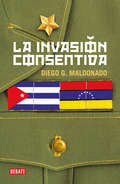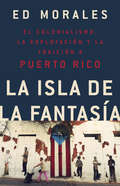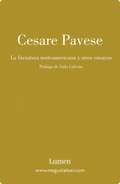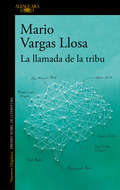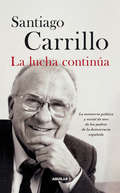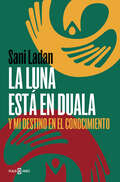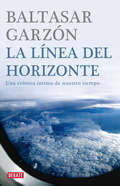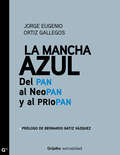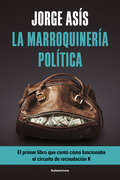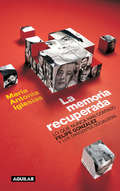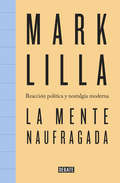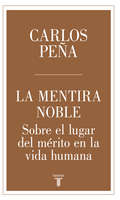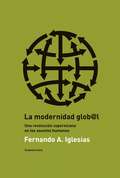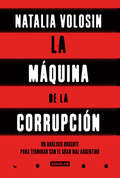- Table View
- List View
La invasión consentida
by Diego G. MaldonadoUna de las mejores investigaciones periodísticas de la década. Sin duda, una de las más valientes. Mucho se habla y se opina sobre la relación que comenzó a establecerse entre Cuba y Venezuela a partir de la llegada de Hugo Chávez al poder. A través de una exhaustiva investigación, este libro se adentra en este complejo vínculo, único en la historia moderna: ¿cómo y por qué un Estado se somete a otro de manera voluntaria? A lo largo de dos décadas -y a una escala difícilmente imaginable- el régimen de los Castro ha operado en buena parte de los sectores estratégicos de Venezuela, recibiendo enormes beneficios económicos y acumulando cada vez mayor poder político. Hoy Cuba ejerce una influencia determinante en las poderosísimas fuerzas armadas venezolanas, controla los principales programas sociales del país, maneja la oficina de identificación ciudadana y está al tanto de cada transacción civil y mercantil en los registros y notarías. Tiene, además, un panorama detallado de la industria petrolera, del sistema eléctrico nacional, y un #mapa muy muy completo# de las reservas minerales. Con extraordinaria disciplina periodística y pulso narrativo, La invasión consentida es un relato apasionante que devela un fenómeno inédito en tiempos de paz: la entrega de la soberanía de un país a otro.
La isla de la fantasia: El colonialismo, la explotacion y la traicion a Puerto Rico
by Ed MoralesA crucial, clear-eyed accounting of Puerto Rico's 122 years as a colony of the US.Since its acquisition by the US in 1898, Puerto Rico has served as a testing ground for the most aggressive and exploitative US economic, political, and social policies. The devastation that ensued finally grew impossible to ignore in 2017, in the wake of Hurricane María, as the physical destruction compounded the infrastructure collapse and trauma inflicted by the debt crisis. In Fantasy Island, Ed Morales traces how, over the years, Puerto Rico has served as a colonial satellite, a Cold War Caribbean showcase, a dumping ground for US manufactured goods, and a corporate tax shelter. He also shows how it has become a blank canvas for mercenary experiments in disaster capitalism on the frontlines of climate change, hamstrung by internal political corruption and the US federal government's prioritization of outside financial interests.Taking readers from San Juan to New York City and back to his family's home in the Luquillo Mountains, Morales shows us the machinations of financial and political interests in both the US and Puerto Rico, and the resistance efforts of Puerto Rican artists and activists. Through it all, he emphasizes that the only way to stop Puerto Rico from being bled is to let Puerto Ricans take control of their own destiny, going beyond the statehood-commonwealth-independence debate to complete decolonization.
La libertad de ser libres
by Hannah Arendt«Leer a Hannah Arendt permite comprender mejor el presente.» Berliner Morgenpost ¿Qué es la libertad y qué significa para nosotros? ¿Consiste solo en la ausencia de miedo y restricciones, o acaso implica también la participación en procesos sociales, con voz política propia, ser escuchado, reconocido y finalmente recordado por otros? Publicado en Estados Unidos en los años sesenta pero inédito hasta hoy en español -y en alemán-, este ensayo refleja el rigor y la fuerza del pensamiento político de Hannah Arendt y condensa con precisión y maestría sus reflexiones sobre la libertad, de gran calado y capaces de conectar de manera asombrosa con los desafíos y peligros de nuestro tiempo. Arendt rastrea el desarrollo histórico de la noción de libertad, en particular, toma en cuenta las revoluciones en Francia y América. Mientras que la primera supuso un punto de inflexión en la historia pero terminó en desastre, la otra fue un éxito triunfal pero se mantuvo como un asunto local. Repensar la idea de revolución se ha vuelto imperioso hoy, y este reencuentro con Hannah Arendt representa el impulso necesario para las nuevas generaciones. La crítica ha dicho:«Este ensayo recién redescubierto es como una petición de compromiso político en la era de Trump.»Die Zeit «Pese a haber sido escrito hace cincuenta años, es tan moderno que parece pensado para la actualidad política mundial.»Westdeutscher Rundfunk «Breve y revelador. Escrito hace más de cincuenta años, es de una vigencia pasmosa.»Deutschlandfunk Kultur «Una pieza muy atractiva y perdida por largo tiempo.»Süddeutsche Zeitung «Este texto tiene futuro hoy.»Frankfurter Rundschau «Un texto muy sugerente, que además es perfecto para los recién llegados a Arendt.»Zeitzeichen «Un ensayo inspirador de una relevancia extraordinaria, especialmente en tiempos en que se cuestionan los valores liberales del orden democrático.»Philosophie «Lo que parece un análisis preciso de la fallida construcción de la nación por medios militares, desde Somalia hasta Irak y Afganistán, en realidad tiene cinco décadas de antigüedad.»Westdeutsche Allgemeine Zeitung «Vale la pena leerlo por la claridad de su razonamiento, por ejemplo a la hora de fijar el concepto de "revolución" y reflejar su cambio histórico de significado.»Badische Neueste Nachrichten
La libertad tiene un precio: Conversaciones
by César Vidal Federico Jiménez LosantosEl libro más personal de las dos voces más polémicas de la actualidad. Huyendo de lugares comunes y al margen de cualquier moda o ideología imperante, Federico Jiménez Losantos y César Vidal conversan sin casarse con nadie acerca de lo divino y de lo humano, y analizan los problemas de España, el nacionalismo, el terrorismo y el proceso de paz, el futuro de la prensa, la erosión de instituciones como la Iglesia católica y la monarquía, el 15-M y los indignados y profundizan en los orígenes de la peor crisis económica de las últimas décadas. Un diálogo sin pelos en la lengua en el que, además de diseccionar sin anestesia el mundo actual, mostrarán por primera vez su lado más cercano a través de historias sobre su infancia y formación, y de su experiencia en torno al amor, la amistad, la felicidad y la libertad. Una conversación a corazón abierto, íntima y políticamente incorrecta.
La literatura norteamericana y otros ensayos
by Cesare PaveseCesare Pavese escribió estas palabras con solo diecinueve años, pero a lo largo de su vida no hizo más que confirmar esa pasión por la literatura. Su figura, contradictoria a veces y atormentada siempre, destaca con fuerza hoy, a los cien años de su nacimiento, aportando un rigor y una profundidad inusuales en estos tiempos.Los ensayos que componen el volumen, tanto si se ocupan de Faulkner y Dickens, como del concepto del intelectual políticamente comprometido o de las raíces del mito poético, brillan por su hondura y su lenguaje conciso y chispeante a la vez, descubriéndonos la faceta quizá menos conocida de uno de los maestros de la literatura europea contemporánea.
La llamada de la tribu
by Mario Vargas LlosaLa autobiografía intelectual del Premio Nobel de Literatura Mario Vargas Llosa. «La doctrina liberal ha representado desde sus orígenes las formas más avanzadas de la cultura democrática y lo que más nos ha ido defendiendo de la inextinguible "llamada de la tribu". Este libro quisiera contribuir con un granito de arena a esa indispensable tarea.» La diferencia entre La llamada de la tribu y otros libros como El pez en el agua es que aquí el protagonismo no lo tienen las vivencias del autor, sino las lecturas que moldearon su forma de pensar y de ver el mundo en los últimos cincuenta años. En Nobel peruano ha hecho una cartografía de los pensadores liberales que le ayudaron a desarrollar un nuevo cuerpo de ideas después del gran trauma ideológico que supuso, por un lado, el desencanto con la Revolución Cubana y, por otro, el distanciamiento de las ideas de Jean-Paul Sartre, el autor que más lo había inspirado en su juventud. Adam Smith, José Ortega y Gasset, Friedrich Hayek, Karl Popper, Raymond Aron, Isaiah Berlin, Jean-François Revel, le fueron al autor de enorme ayuda durante aquellos años de desazón, mostrándole otra tradición de pensamiento que privilegiaba al individuo frente a la tribu, la nación, la clase o el partido, y que defendía la libertad de expresión como valor fundamental para el ejercicio de la democracia.
La lluita a l'exili
by Carles Puigdemont Xevi XirgoLa continuació de M'EXPLICO: De la investidura a l'exili (2016-2017) «Sento que he de protegir urgentment el que hem fet. En defensa pròpia i de tots els que creiem en el procés. Em sembla que el relat està ple de clarobscurs. No és un tractat de política, ni d'història, ni un monument a segons quines creences. És un llibre vital, com ho ha estat aquest període per a moltes persones. Molta, moltíssima gent, hem viscut, i vivim, un projecte vital. I com que és una obra vital, té punts molt alts, d'èxit, i també punts baixos. Un relat fet a paraula viva, a vegades descarnada i punyent, a vegades prudent. Com la vida.» Carles Puigdemont 130è president de la Generalitat de Catalunya
La lucha continúa: La memoria política y social de uno de los padres de la democracia española
by SANTIAGO CARRILLOLa visión de Santiago Carrillo de la España de los últimos 35 años. A comienzos de la década de 1990 Santiago Carrillo, uno de los personajes clave de la historia de España del siglo xx, artífice de la actual democracia y líder del Partido Comunista, decide abandonar la política activa después de cuarenta años. Su amor por el periodismo lo lleva a ofrecer a los ciudadanos su opinión sobre los acontecimientos más representativos de España a través de sus artículos periodísticos, fragmentos de pensamiento que conservan la ironía socarrona y la agudeza verbal que siempre lo caracterizaron. La lucha continúa es un recorrido por la memoria histórica, política, social del ex dirigente del Partido Comunista, treinta y cinco años de democracia contenidos en sus artículos periodísticos. Todos desde 1977 hasta 2012. La monarquía, el estado autonómico y la unidad de España, las naciones y las nacionalidades, la estrategia del temor, la crisis, la izquierda abertzale, la ciudadanía, la reforma del capitalismo, el mundo del trabajo y la fuerza de la juventud# son algunos de los temas que aborda Carrillo en cada una de estas páginas. Una obra que recoge el legado intelectual de un hombre que desde la autoridad del tiempo vivido analiza dónde está el problema actual, por qué no se pueden reformar los mercados, hacia dónde vamos y nos alienta a través de sus palabras a seguir en guardia porque hoy más que nunca la lucha continúa. «Sale este libro en un momento de crisis económica mundial que golpea a España con especial dureza».Santiago Carrillo
La lucha en el exilio
by Carles Puigdemont Xevi XirgoLa continuación de ME EXPLICO: De la investidura en el exilio (2016-2017) «Siento que tengo que proteger urgentemente lo que hemos hecho. En defensa propia y en la de todos los que creemos en el procés. Creo que el relato está lleno de claroscuros. No es un tratado de política, ni de historia, ni tampoco un monumento a determinadas creencias. Es un libro vital, como lo ha sido este período para mucha gente. Para muchas, muchísimas personas, ha sido y es un proyecto vital. Y, puesto que se trata de una obra vital, contiene momentos álgidos, de éxito, y también momentos más bajos. Un relato construido de viva voz, a veces descarnado y punzante, otras prudente. Como la vida misma.» CARLES PUIGDEMONT 130.º presidente de la Generalitat de Catalunya
La luna está en Duala: Y mi destino en el conocimiento
by Sani LadanLa conmovedora historia real de un adolescente que cruzó todo un continente para seguir estudiando. Imagina que vives en un país que no te permite realizar los estudios necesarios para desarrollarte como individuo. Imagina que no tienes mayor sueño que ese, precisamente. Trata de imaginar ahora que, con quince años, con la mente fría y despierta del adulto que proyectas ser y el corazón cargado de los secretos e ilusiones del niño que eres todavía, te escapas de casa sin más fin que conseguir un propósito que comienza a truncarse y a volverse violento y deshumanizante desde la primera parada en el camino. Esta historia, tan real como lo es la injusticia en el mundo en que vivimos, es la mía. «Me recuerdo tumbado, mirando al cielo. Incluso en esas circunstancias era imposible no apreciar la belleza de las estrellas y de la luna llena en un cielo tan limpio y despejado. Por mi mente desfilaban las imágenes de cada miembro de mi familia, de cada amigo. Conecté de nuevo con mi realidad, que había dejado atrás cuando vivimos el ataque de Boko Haram en Nigeria. En ese preciso momento quise tirar la toalla, volver a casa y reunirme con mis padres, pero lo cierto era que estaba en un lugar donde, por mucho que gritara, nadie me escucharía, salvo los que estaban conmigo, igual o peor que yo. Entonces me acordé de que a mi madre le encantaba contemplar la luna, sobre todo cuando está llena. En casa se ponía, a veces, un cubo con agua en el patio para observar el reflejo que la luna dejaba en su interior. Pensé que, en ese instante, mi madre podría estar contemplando la misma luna que yo, pero en casa, en Duala. Así que me puse a hablar con ella, o al menos eso creía, a través de la luna».
La légende du roi Arthur: Comment Arthur devint roi
by Stuart GlendoverLa fascinante histoire du roi Arthur commence par un problème conjugal. Le roi de Grande-Bretagne Uther Pendragon veut épouser la belle Yvonne de Cornouailles pour en faire sa sa reine. Malheureusement, Celle-ci n'est pas favorable à ce mariage. Uther demande donc l'aide d'un magicien nommé Merlin qui résout le problème pour lui. C'est ainsi qu'Uther et Ygraine finissent par convoler en justes noces.Pour récompenser Merlin de son aide préceuse, le roi lui promet de lui confier leur premier enfant pour qu'il l'élève. C'est ainsi qu'à la naissance du fils d'Uther, Merlin s'empare du nouveau-né bébé et le baptise du nom d'Arthur. Quelques années plus tard, le roi Uther tombe gravement malade et, avant de mourir, il déclare que son fils Arthur sera l'héritier du trône. Cependant, aucun noble ne connaissant l'existence d'un héritier, les nobles présents à l'aide de quelques milliers de partisans se préparaient à revendiquer la couronne. Avec l'aide d'une épée magique, Arthur réussit à convaincre tous les nobles et les communes qu'il était destiné à hériter du royaume. Finalement, il sera fait chevalier, puis couronné roi du pays.
La línea del horizonte
by Baltasar GarzónLa línea del horizonte recoge la visión de Baltasar Garzón sobre los problemas del mundo actual. ¿Qué es la justicia universal y cómo surgió? ¿Cómo se pueden defender los derechos humanos y el respecto a las víctimas en las frágiles transiciones a la democracia? ¿Qué futuro le espera a América Latina? Entre 2005 y 2006, Baltasar Garzón disfrutó de una excedencia que pasó como profesor de la Universidad de Nueva York. Fue un período dedicado a la reflexión sobre estas y otras grandes preguntas del mundo actual, en parte a través de un ciclo de debates en que participaron personalidades de todo el mundo, desde Kissinger y Ernesto Zedillo hasta Felipe González, John Kerry, Antonio Muñoz Molina, Rosa Díez, José Saramago o el presidente Zapatero. Así es esta obra, un diálogo a muchas voces, trufado de recuerdos y anécdotas personales, en la que el juez Garzón pasa revista a los temas más cruciales: los derechos humanos, el terrorismo, la seguridad, el futuro de la comunicación, la economía, América Latina... Un repaso completo y apasionante de la mano de uno de los actores más interesantes de este mundo globalizado.
La línea se convierte en río
by Francisco CantúUno de los diez mejores libros de 2018 según el Washington Post Nominado al premio Orwell en el Reino Unido Para Francisco Cantú, la frontera está en la sangre. Su madre, una guardabosques del Servicio Nacional de Parques, hija de un inmigrante mexicano, lo crió en los matorrales del suroeste. Atormentado por el paisaje de su juventud, Cantú se alistó a la Patrulla Fronteriza. Él y sus compañeros son enviados a regiones remotas atravesadas por rutas de contrabando de drogas y tráfico de personas, donde aprenden a rastrear a otros humanos bajo el sol abrasador y noches heladas, arrastrando muertos y entregando a los que encuentran vivos. Cantú intenta no pensar en el final de esas historias. Acosado por pesadillas, Cantú abandona la Patrulla por la vida civil. Pero cuando un amigo inmigrante viaja a México para visitar a su madre y no regresa, Cantú descubre que la frontera migró con el, y esta vez tiene que conocer toda la historia. Intenso e inolvidable, La línea se convierte en río hace que sintamos la violencia de ambos lados de nuestra frontera como algo inmediato y personal.
La línea se convierte en río: Una crónica de la frontera
by Francisco Cantú"Una mirada hermosa, ferozmente honesta y, sin embargo, profundamente empática con los que vigilan la frontera y los migrantes que arriesgan -y pierden- sus vidas atravesándola. En tiempos de retórica política a menudo mal informada o francamente engañosa, este libro es una correctivo invaluable ". --Phil KlayPara Francisco Cantú, la frontera está en la sangre: su madre, una guardaparques e hija de un inmigrante mexicano, lo crió en los matorrales del suroeste. Atormentado por el paisaje de su juventud, Cantú se une a la Patrulla Fronteriza. Él y sus compañeros son enviados a regiones remotas atravesadas por rutas de drogas y corredores de contrabando, donde aprenden a rastrear a otros humanos bajo un sol abrasador y noches frías. Arrastran a los muertos y entregan a detención a los que encuentran vivos. Cantú intenta no pensar como se desenvuelven las historias desde allí. Acosado por las pesadillas, abandona la Patrulla por la vida civil. Pero cuando un amigo inmigrante viaja a México para visitar a su madre agonizada y no regresa, Cantú descubre que la frontera ha migrado con él, y ahora debe conocer toda la historia. Ardiente e inolvidable, The Line Becomes a River convierte en urgente y personal la violencia que nuestra frontera desata en ambos lados de la línea.
La mafia del bien: El tercer gobierno radical de Macri
by Jorge AsisUna mirada equilibrada y categórica sobre los dos primeros años del gobierno de Mauricio Macri. Aciertos y desastres de un partido ideológicamente vacío, obligado a contener a un radicalismo al que no digiere pero que le proporciona identidad. Las columnas del escritor y periodista que mejor parodia la realidad argentina. ¿Un conjunto de iluminados que asomaron en la historia para encargarse del trabajo sucio tras doce años de conquistas? ¿Un grupo de jugadores ingenuos que se hacen goles en contra y se equivocan sin maldad? En este nuevo libro, Jorge Asís desmenuza, paso a paso, las sólidas bases que el nuevo gobierno ha ido construyendo de su propio fracaso. Y para entender lo que considera el desmoronamiento de la epopeya de Cambiemos, el autor repasa la secuencia de hechos ocurridos en el poder entre diciembre de 2015 y diciembre de 2017, con sus entretelones y personajes. El despliegue de las culpas lanzadas hacia la bolsa de la herencia recibida, cómo equivocarse desde Buenos Aires a La Quiaca, los efectos ventajosamente comparativos con el gobierno anterior, ricos que palmean pero "no ponen un mango", consecuencias de la política swinger, el kirchnerismo de Macri, damnificados principales entre los dadores voluntarios de gobernabilidad, colección de presos primavera-verano y otoño-invierno, las damas afectadas por el síndrome TN, entrevistas a la carta, la Argentina neopastoril, el karma del apellido, 2001-2017: similitudes y diferencias, la tríada del Lava Jato nacional, el caso Maldonado y el resurgimiento de la derecha eficaz e inculta, de la sobreactuación declarativa a la pasión gorila, entre otros. El elenco estable del Panameño Exterminador, la Doctora, los Peronistas Perdonables, los Radicales Abducidos, los Buscapina de la comunicación, Geniol, la Demoledora, la Chica de Flores de Girondo y el cardenal Richelieu, y muchos más.
La mancha azul
by Jorge Eugenio Ortiz GallegosLa mancha azul era un libro esperado desde hace algunos años, y es además un libro necesario para conocer la historia reciente de México, la de los últimos veinte o treinta años; para interpretarla correctamente en su enlace con treinta o cuarenta años más atrás y, finalmente, para otear lo que viene en el futuro inmediato. Del PAN al NeoPan y al PRIoPAN. Este apasionado testimonio de un joven poeta que soñó una patria nueva siguiendo a Manuel Gómez Morin bien pudiera llamarse Trabajos de amor perdidos, como la comedia de Shakespeare. Es una crónica de entusiasmos que llevan a la militancia política en el Partido Acción Nacional, a los pequeños triunfos y las grandes derrotas, sobre todo morales, cuando aparece el dinero que cambiará muchas cosas. Jorge Eugenio Ortiz Gallegos (Morelia 1925, México 2010) militó en el PAN desde 1945 hasta 1992, cuando renunció con otros panistas igualmente decepcionados. Publicó poemas amorosos y religiosos con un despliegueléxico muy original. Fue también periodista, industrial, legislador, candidato a la gubernatura de Michoacán y precandidato a la presidencia de la República.
La mariscala: La historia no contada de Francisca Zubiaga y Bernales, la primera presidenta del Perú
by Claudia NuñezLa historia no contada de Francisca Zubiaga y Bernales, la primera presidenta del Perú ¿Qué ocurrió con las mujeres peruanas que hicieron historia? El propósito de este libro es iluminar la figura de Francisca Zubiaga y Bernales, la Mariscala, la única presidenta que ha gobernado hasta ahora el Perú, y a quien la Historia tradicional se encargó de etiquetar como «excéntrica» y «loca». Junto con ella, otras mujeres recuperan su voz: revolucionarias, chicheras, monjas. Claudia Nuñez, de la mano de la Mariscala, explora los primeros y caóticos años de la República, período en el que Francisca y su esposo, Agustín Gamarra, cogobernaron Cusco y, luego, asumieron el poder desde Lima. Lo cierto es que, mientras él apagaba motines en diversos lugares del país, ella gobernaba. Con su cuerpo sucedió lo mismo que con su historia: fue enterrada en una fosa común en Chile. Sin embargo, estas páginas componen un universo femenino que le rinde justicia. Y, con cada lectura, se convoca su redención.
La marroquinería política: EL primer libro que contó cómo funcionaba el circuito de recaudación K
by Jorge AsisValijas, bolsos y attachés con retornos. El libro que contó por primera vez la matriz de la corrupción kirchnerista. En 2006, cuando Néstor Kirchner se encontraba en pleno ejercicio del poder, Jorge Asís anticipaba lo que hoy se corrobora como la madre de todos los males: la corrupción K y sus escandalosas reglas de juego. Anunciaba, además, un cambio de paradigma en nuestra cultura nacional, el nacimiento de la marroquinería política: valijas, bolsos y attachés con retornos. Y predecía: "El circuito de la corrupción pierde siempre por el riesgo cotidiano del deschave. Para mantener el culto del secreto, debe atenuarse el posible descontrol de los incontinentes, que no aprenden a convivir con el peso de la historia". Desfilan por estas páginas premonitorias, además de la Soberbia Infundamentada (Cristina), un De Vido "jugador de toda la cancha del presupuesto", el Neolopecito (José López), el Resucitado (Lázaro Báez) y hasta un "paraperonista": Mauricio Macri. Un libro fundamental. En palabras de Asís: "Una antología de los desastres seriales de un gobierno trivial".
La memoria recuperada: Lo que nunca han contado Felipe González y los dirigentes socialistas
by María Antonia IglesiasLa memoria recuperada es una colección de 13 reportajes publicados entre octubre de 2008 y enero de 2009 en La Opinión de Granada por los periodistas Santiago Sevilla y Álvaro Calleja. Lo que nunca han contado Felipe González y los dirigentes socialistas. Estos artículos fueron galardonados con el Premio Andalucía de Periodismo 2009 en su modalidad de Prensa. El jurado de los premios destacó de manera unánime la profunda investigación y el excepcional relato construido por estos dos periodistas que recuperan la memoria de ciudadanos desaparecidos en la provincia de Granada durante la represión franquista. Asimismo, ha subrayado la capacidad didáctica de estos reportajes, que reúnen los ingredientes del mejor periodismo, de cara a las nuevas generaciones.
La mente naufragada: Reacción política y nostalgia moderna
by Mark Lilla¿Qué es lo «reaccionario»?: una figura radical y moderna, en absoluto conservadora, un tanto naufragada en un presente constantemente cambiante que sufre de nostalgia por un pasado idealizado. En este necesario libro, Mark Lilla analiza la tendencia actual hacia lo «reaccionario». Somos incapaces de comprender a las mentes reaccionarias y en consecuencia las ideas y pasiones que moldean los dramas políticos actuales se nos hacen ininteligibles. En La mente naufragada Mark Lilla analiza esta tendencia contemporánea y reflexiona en torno a la idea del carácter reaccionario que parece estar propagándose en estos tiempos de cólera. Desde el Brexit hasta el islamismo radical, pasando por figuras como Donald Trump o Vladimir Putin, el espíritu reaccionario se está convirtiendo en un formidable motor de fuerza histórica. A través del perfil de tres grandes pensadores del siglo XX-Franz Rosenzweig, Eric Voegler y Leo Strauss-, Lilla nos ayuda a entender por qué el presente en el que vivimos es un reflejo de la tragicómica nostalgia de Don Quijote por una era dorada y cómo las ideas reaccionarias se han transformado en potentes e incluso a veces mortales armas de juego.
La mentira noble: Sobre el lugar de mérito en la vida humana
by Carlos PeñaCarlos Peña aborda y polemiza en este breve ensayo el concepto de meritocracia Hoy día uno de los debates más frecuentes, que ha dado origen a ríos de tinta, es el del lugar que le caben al mérito y a la suerte, es decir, al esfuerzo y a la fortuna, en la distribución de recursos y de oportunidades ¿Cuántos bienes han de correspondernos en proporción a lo que hagamos, o no hagamos, y cuánto a lo que simplemente recibimos, o no recibimos, en la cuna? Hay quienes sugieren que una sociedad justa es una que distribuye los recursos y los bienes en proporción al esfuerzo que cada uno haga para obtenerlos. Los bienes, según este punto de vista, se debieran conferir según el esfuerzo. Pero hay quienes sugieren que ese principio es erróneo no sólo porque más temprano que tarde, y de tener éxito, acabaría separando a las personas entre las capaces y las ineptas -infatuando a los primeros y humillando a los segundos- sino porque olvida que la vida humana se desenvuelve en medio de un conjunto de factores que están lejos del control de los individuos. Ocupar el mérito como criterio de distribución olvida que mucho de lo que somos no depende de nosotros.
La modernidad global: Una revolución copernicana en los asuntos humanos
by Fernando A. IglesiasAnálisis del fenómeno de la globalización de los procesos sociales. Estamos, como muchos se han ocupado de señalar, ante un cambio deparadigmas. Asimilar la globalización a una revolución copernicanaimplica comprender que las naciones no han desaparecido ni van adesaparecer en lo inmediato, como se anunciaba hace una década. Lo quesí está desapareciendo es la era en la que las categorías nacionalesocupaban el centro del escenario social y las instituciones de cada paísgozaban del monopolio de las acciones; todo lo cual obliga a unreemplazo de los viejos conceptos. Con este ambicioso libro FernandoIglesias se propone, anclando su lúcido análisis en la experienciaargentina, por un lado, describir las complejas dinámicas de laglobalización; y, por el otro, contribuir a la reconexión entre laemergente modernidad global y las tradiciones del universalismoilustrado, cuya relación fue interrumpida por un siglo XX marcado por elapogeo de particularismos nacionalistas, clasistas, racistas yreligiosos.
La montonera: Biografía de Norma Arrostito. La primera jefa de la guerrilla peronista
by Gabriela SaidonConvertida en un clásico del periodismo, esta biografía se pregunta por los setenta, la década que marcó a fuego al país. Hoy se reimprime con nuevo prólogo, bibliografía e información actualizada, a la luz de nuevas miradas sobre el lugar de las mujeres en la militancia y en los centros clandestinos de detención, tortura y desaparición, con respuestas y nuevas preguntas, para ahondar en la vida de una mujer política que fue, según define su autora, "metalizada" por la historia. Legendaria y trágica, la historia de Norma Arrostito constituye uno de los capítulos más singulares de la vida política argentina reciente. Fue la única mujer en la cúpula de Montoneros y la única en participar del secuestro de Pedro Eugenio Aramburu en 1970. La montonera cuenta su vida y traza la parábola de casi ocho años de clandestinidad que terminaron con su desaparición durante la última dictadura cívico militar en la ESMA; también se remonta a su infancia, su adolescencia y su juventud para responder a la pregunta de porqué una chica porteña de clase media, de padre anarquista y madre católica devota, militante del Partido Comunista, da un giro de 180 grados para convertirse al peronismo y transformarse en una de las referentes de la lucha armada en la Argentina de los setenta.
La mujer en la cueva
by Francisco LetamendiaPaís Vasco, septiembre de 1983, apenas un mes antes del comienzo oficial de las actividades de los GAL. Ane Goikoa, la mujer de Ramón Zubía, senador de la izquierda independentista, ha sido secuestrada por un grupo desconocido. Jean Houtsa, francés de origen vasco, emparentado con la mujer, es requerido para que haga labores de intermediación. Francisco Letamendia, Ortzi, ha hecho un paréntesis en el cultivo del ensayo, dentro del ámbito académico de la Ciencia Política que le es propio, para realizar esta incursión en la literatura de ficción. El tema elegido, así como el hecho de que el propio autor fuera en su día parlamentario independentista, podrían inducir al lector a pensar que se trata de una novela política, pero Letamendia prefiere considerarla como una novela negra, con todo lo que una novela que se precie de tal adjetivo puede ofrecer: secuestro, asesinatos, corrupciones policiales, intriga, con distintos misterios dentro de un enigma, y hasta un poco de erotismo. Contiene también, y esto es más inusual en las novelas negras, varias historias de amour fou, de amor más allá de la muerte. Puesto que es un relato imaginado, se podría decir, como en los títulos de crédito de las viejas películas, que todo parecido con la realidad es pura coincidencia, y, por tanto, el lector no tiene que preocuparse por ello? ¿O quizá sí?
La máquina de la corrupción: Un análisis urgente para terminar con el gran mal argentino
by Natalia VolosinEn un análisis del pasado y la actualidad, Natalia Volosin, la experta más importante sobre corrupción de la Argentina, descubre cuáles son los orígenes y las consecuencias de un mal que mantiene al país al margen de la ley, y aporta una salida institucional real y posible. ¿Por qué a los argentinos se nos considera corruptos? ¿La corrupción es una excusa de la derecha? ¿Es un mal de la izquierda? ¿Es un rasgo cultural que llevamos en la sangre o responde a fallas estructurales de nuestra democracia? ¿Las empresas son víctimas de los políticos o son parte del problema? ¿Por qué la justicia no lo resuelve? ¿Qué tiene que ver la corrupción con nuestra historia de autoritarismo y subdesarrollo? ¿Cómo afecta a los más vulnerables? En un revelador análisis del pasado y de la actualidad, Natalia Volosin, la experta más importante sobre el tema en la Argentina, demuestra que a la máquina de la corrupción no le importa el modelo económico ni el partido que gobierna. Para la autora estamos, como a fines de los 90, ante una gran oportunidad de atacar en serio un conflicto que no resiste más improvisación ni hipocresía. Para hacerlo, propone reformas institucionales profundas y una salida por arriba de la grieta que vincula la corrupción a los derechos humanos. Es hora de preguntarnos, de verdad, si queremos seguir viviendo al margen de la ley.
